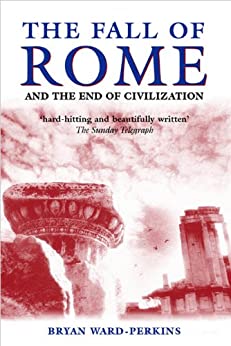I thought my vast readership might welcome an occasional break from the usual “this date in history” approach and so I will make so bold as to talk here every now and again about some of my favourite history books that might also appeal to a non-specialist.
“Of the making of many books there is no end and much study is a weariness of the flesh.” So sayeth the Preacher in Ecclesiastes 12:12 and as one who has spent many decades in such an activity I can attest to its truth. Therefore, I will avoid tomes that are classics but snoozers (yes, I’m talking about you, Edward Gibbon, with your six-volume History of the Rise and Fall of the Roman Empire and you, Arnold Toynbee, with your interminable 12-volume A Study of History).
Let’s begin with a book that has so many virtues: it is short, argumentative, and deadly to its foes. It is The Fall of Rome and the End of Civilization by Bryan Ward-Perkins.

When I was a student at university, I was taught that the end of the Roman Empire in the fifth century was violent and tragic, that it meant a collapse of civilization in western Europe that would take a thousand years to rebuild, that it ushered in a Dark Age.
Then along came postmodern historians in the 1980s and 1990s who shrank at the notion that there was a real distinction between civilization and barbarism — that was a racist idea that “othered” the Germanic peoples. Instead of a conquest of Roman forces and way of life, there was a vigorous intermingling — kind of like rough sex, after which the participants would share a cigarette and stare dreamily at the ceiling. Besides, the only sources testifying to violence were books written by the Romans and postmodernists knew how slippery and unreliable “the text” could be.
The late 20th century was also the time of growing European integration and the development of common history curricula in the European Union nations. Since Germany was the dominant power in the EU, it was felt that one mustn’t “mention the war”, either those periods of German nastiness in 1914-18 and 1939-45 or the sacks and pillaging of the 400s and 500s.
So, for a number of years I revised my lectures and taught that the fall of Rome wasn’t such a big deal after all. Then I read Bryan Ward-Perkins’ book which blew the doors off of the postmodern bus. OK, he said, you don’t trust texts: let’s just look at the physical evidence, the bits and pieces that archaeologists dig up. And using the comparative skeletal sizes of cattle in garbage pits of various era, the relative quality of mass-manufactured goods like dinner plates, the absence of graffiti or any other evidence of literacy, the remains of abandoned towns, he demonstrated that the Fall was nasty and produced a society that was incomparably poorer, less populated, more rural, illiterate, without a money economy or even (as was the case in Britain for a century) incapable of operating a potter’s wheel.
The postmodernists fled shrieking and a blow was struck for genuine and entertaining scholarship.
Seems like you are flirting dangerously with thought crime.
I read this book some years ago (three? four?) and found it persuasive and intelligent. And the parallels between Rome and the current EU (and US, for that matter) were chilling.
So far, I’ve relied on my well-deserved obscurity to keep me from the eyes of the thought police. I’m glad you liked the book.